Related Research Articles

The Amstrad CPC is a series of 8-bit home computers produced by Amstrad between 1984 and 1990. It was designed to compete in the mid-1980s home computer market dominated by the Commodore 64 and the ZX Spectrum, where it successfully established itself primarily in the United Kingdom, France, Spain, and the German-speaking parts of Europe.
Copy protection, also known as content protection, copy prevention and copy restriction, is any measure to enforce copyright by preventing the reproduction of software, films, music, and other media.
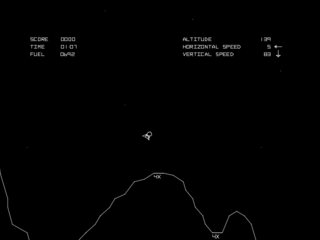
Lunar Lander is a genre of video games loosely based on the 1969 landing of the Apollo Lunar Module on the Moon. In Lunar Lander games, players control a spacecraft as it falls toward the surface of the Moon or other astronomical body, using thrusters to slow the ship's descent and control its horizontal motion to reach a safe landing area. Crashing into obstacles, hitting the surface at too high a velocity, or running out of fuel all result in failure. In some games in the genre, the ship's orientation must be adjusted as well as its horizontal and vertical velocities.

WriteNow is a word processor application for the original Apple Macintosh and later computers in the NeXT product line. The application is one of two word processors that were first developed with the goal that they be available at the time of the Mac product launch in 1984, and was the primary word processor for computers manufactured by NeXT. WriteNow was purchased from T/Maker by WordStar in 1993, but shortly after that, WordStar merged with SoftKey, which ultimately led to its discontinuation. It had a combination of powerful features, excellent performance, and small system requirements.
Timeworks Publisher was a desktop publishing (DTP) program produced by GST Software in the United Kingdom and published by Timeworks, Inc., in the United States.
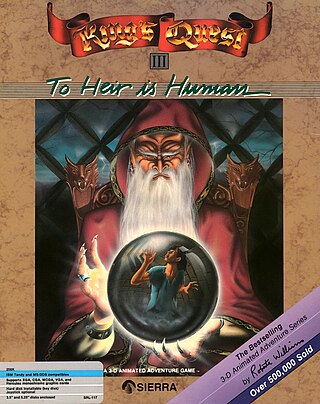
King's Quest III: To Heir Is Human is the third installment in the King's Quest series of graphic adventure games developed and released by Sierra On-Line in 1986. The game was originally released for the Apple II and PC DOS, and later ported to several other computer systems. It was the first title game in the series not to feature King Graham as the player character.
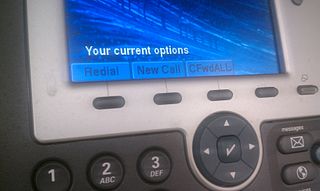
A soft key is a button flexibly programmable to invoke any of a number of functions rather than being associated with a single fixed function or a fixed set of functions. A softkey often takes the form of a screen-labeled function key located alongside a display device, where the button invokes a function described by the text at that moment shown adjacent to the button on the display. Soft keys are also found away from the display device, for example on the sides of cellular phones, where they are typically programmed to invoke functions such as PTT, memo, or volume control. Function keys on keyboards are a form of soft key. In contrast, a hard key is a key with dedicated function such as the keys on a number keypad.
A bit nibbler, or nibbler, is a computer software program designed to copy data from a floppy disk one bit at a time. It functions at a very low level directly interacting with the disk drive hardware to override a copy protection scheme that the floppy disk's data may be stored in. In most cases the nibbler software still analyses the data on a byte level, only looking to the bit level when dealing with synchronization marks (syncs), zero-gaps and other sector & track headers. When possible, nibblers will work with the low-level data encoding format used by the disk system, being Group Coded Recording, Frequency Modulation, or Modified Frequency Modulation.
Rob Northen Copylock is a copy-protection system designed to prevent disk duplication with standard floppy disk drives on the Amiga, Atari ST, and IBM PC compatibles. It was created by British programmer Rob Northen after founding his own company Copylock Software. It was used mainly to prevent games from being copied by regular users.
Amiga software is computer software engineered to run on the Amiga personal computer. Amiga software covers many applications, including productivity, digital art, games, commercial, freeware and hobbyist products. The market was active in the late 1980s and early 1990s but then dwindled. Most Amiga products were originally created directly for the Amiga computer, and were not ported from other platforms.

Microdeal was a British software company which operated during the 1980s and early 1990s from its base at Truro Road in the town of St Austell, Cornwall. The company, founded by John Symes was one of the major producers of games and other software for the 8-bit home computers of the time, in particular the Dragon 32 and the similar Tandy TRS-80 Color Computer ("CoCo").

Computist was a magazine devoted to the Apple II personal computer that was published by Charles R. Haight under the SoftKey Publishing name, between 1981 and 1993, for a total of 89 issues. The magazine was based in Tacoma, Washington. Originally launched as Hardcore Computing, the 'hardcore' part was formally dropped from the title with the 27th issue.

The Apple II Plus is the second model of the Apple II series of personal computers produced by Apple Computer. It was sold from June 1979 to December 1982. Approximately 380,000 II Pluses were sold during its four years in production before being replaced by the Apple IIe in January 1983.
Anatolius of Laodicea, also known as Anatolius of Alexandria, was a Syro-Egyptian saint and Bishop of Laodicea on the Mediterranean coast of Roman Syria in AD 268. He was not only one of the foremost scholars of his day in the physical sciences, as well as in Aristotelian and Platonic philosophies, but also a renowned computist and teacher of the Neoplatonic philosopher Iamblichus.
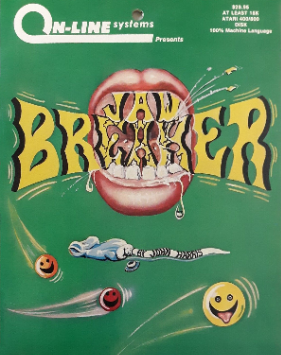
Jawbreaker is a Pac-Man clone programmed by John Harris for Atari 8-bit computers and published by On-Line Systems. Released in 1981 before an official version of Pac-Man was available, it was widely lauded by reviewers and became a major seller. The story of its creation and Harris's Atari 8-bit implementation of Frogger form a portion of Steven Levy's 1984 book, Hackers: Heroes of the Computer Revolution.
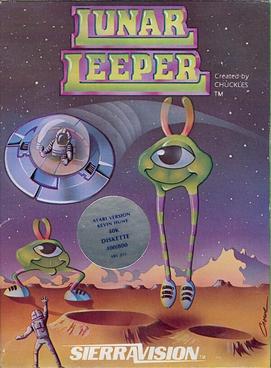
Lunar Leeper, also released as Lunar Leepers, is a horizontally scrolling shooter written by Chuck Bueche and published under Sierra On-Line's SierraVision label in 1982. It was released for the Apple II, Atari 8-bit computers, Commodore 64, and VIC-20. The Apple II version was copy-protected using Sierra's Spiradisc system.

Where in Europe Is Carmen Sandiego? is a 1988 European geography-based educational computer game in the Carmen Sandiego detective mystery franchise. It was originally published by Broderbund in 1988 for Apple II, Commodore 64, and DOS, and ported to the Amiga and Macintosh in 1989. It is the third Carmen Sandiego title, after Where in the World Is Carmen Sandiego? (1985) and Where in the USA Is Carmen Sandiego? (1986). Under the guidance of The Acme Agency's chief, the player completes cases to catch Carmen's henchmen; they accomplish this by traveling to European cities to find clues relating to the crook's last known whereabouts, and by gaining enough character data to issue a warrant of arrest. Once the player has captured all 15 thieves, they can pursue Carmen herself.

Learning with Leeper is a 1983 educational video game developed and published by Sierra On-Line. Similar to Learning with FuzzyWOMP (1984), it teaches colours, numbers, and the alphabet to players. It reuses the character from the Sierra On-Line game Lunar Leepers
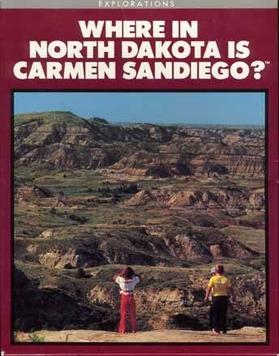
Where in North Dakota Is Carmen Sandiego? is a 1989 edutainment video game. It is the fourth game in the Carmen Sandiego video game series after World (1985), U.S.A. (1986), and Europe (1988). Having observed the popularity of the Carmen Sandiego franchise in the education of school children, educators were inspired to develop a North Dakota version to teach North Dakotans about their state's history and geography.

Donald's Alphabet Chase is a educational video game developed by Westwood Associates and published in 1988 by Walt Disney Computer Software. It was released on various home computers including the Amiga, Amstrad CPC, Apple II, Commodore 64, MS-DOS and ZX Spectrum. An Atari ST version was planned by Nathan Software but got no release. The game was released in five different languages including English, Spanish, French, Italian and German.
References
- 1 2 Levy, Steven (2010). "Chapter 19: Applefest". Hackers: Heroes of the Computer Revolution (25th Anniversary ed.). O'Reilly Media. pp. 326–332. ISBN 978-1449388393.
- ↑ McFadden, M. M. (1987). "Antique Softkey for Frogger". Computist (41). SoftKey Publishing: 28–29.
- 1 2 Jones, Bruce W. (1985). "Spiradisk Info". Hardcore Computist (25). SoftKey Publishing: 4.
- ↑ Etarip, Rich (1990). "Softkey for Lunar Leepers". Computist (83). SoftKey Publishing: 10–11.
- ↑ Etarip, Rich (1990). "Softkey for Jawbreaker". Computist (82). SoftKey Publishing: 16.